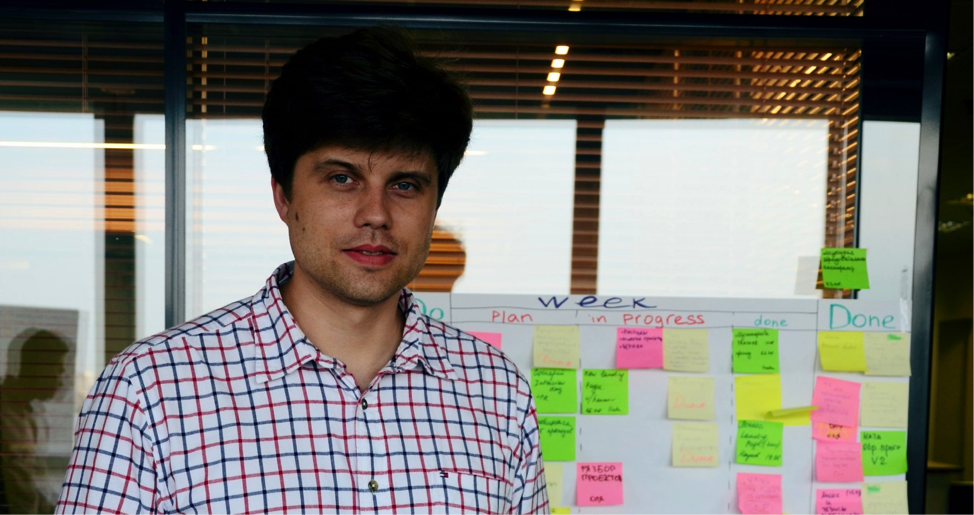Paul Graham (Y Combinator) and Dmitry Kalaev (FRII accelerator) about the reasons for the success and failure of startups

We are starting to publish new format materials on the FRIA blog - in order to compare the approaches to the development of startups in the US and Russia, we will arrange cross-interviews, during which well-known entrepreneurs, investors and IT experts of two will answer the same questions countries. The first issue presents the views of the founder of the famous accelerator Y Combinator and the director of the acceleration and educational programs of the IIDF Dmitry Kalaev.
In preparing the material, publications were used in the Paul Graham blog ( 1 , 2 ) and interviews with Gigaom , The Information and Inc.com , as well as open data collected on the Internet. Earlier, we published a translation of Paul’s fresh lecture at the Ycombinator course at Stanford.
')
Did you have a case when you refused a startup, and he later became successful and famous?
Paul Graham: It happens all the time, we even have a list. Certainly, there were cases when we refused to people who subsequently made us regret our decision. I will not mention the names of the companies, but such ones were exactly.
We usually do not store information about why we refused a particular team, but we record interviews with start-ups and our discussions after them. We need to study these records somehow, although I’m not sure that they were all safe - we could have lost some.

Paul graham
You just need to understand that the startup, which we refused, does not disappear - it can be financed by other accelerators clones Y Combinator. It is not our clones who give money to everyone, but it is they who finance many.
Dmitry Kalaev: Frankly speaking, I don’t remember that right away, but there was an interesting case for a company that organizes apartment cleaning (iChisto) - we planned to take the guys to the accelerator, but right before the start of the program they came to us and reported that they had attracted $ 300 thousand from another investor. We were okay with this, but, in my personal opinion, the team attracted such money early enough, since it did not yet have a clear idea of how and what to spend it on. And so that someone we did not have time to take, and then bite your elbows - I do not remember that.

Dmitry Kalaev
Does it ever happen that you take an startup team “in advance” to the accelerator just because you liked the founders, whose idea might not be the best?
Paul Graham: A classic example of such a situation is Airbnb. We didn’t like the idea of this project at all, but its founders really liked it. And now it's a global brand, like Apple. Now, even no one knows, why they have such a name, just the service is used by millions of people.
When the guys just presented us their project, they were very energetic and creative - for example, they said that in order to make ends meet during the presidential campaign in 2008 in the USA, they had to sell corn flakes with portraits of politicians Barack Obama and John McCain. Partner Y Combinator Jessica Livingstone listened to them and said: "We need to give these guys money."
This is one of those famous stories where people were almost defeated, but did not surrender and succeed. They were deeply in debt, they had to sell flakes with portraits of politicians (they sold them for $ 30,000, by the way) - they were designers and created beautiful boxes.

They demonstrated not only energy, but also ingenuity in a difficult situation when the end was so close. Most people in their position would have lowered their hands.
Entrepreneurs not only did not give up, but were able to get out of a difficult situation very nicely and with the quality inherent in the founders of successful startups. Therefore, we decided that despite the fact that their idea was “not very” (then we did not like it), the guys would be able to come up with something else, the main thing is to give them finances.
Dmitry Kalaev: We quite certainly did this during the first sets in the accelerator, but later on, this practice was reduced. Still, if there is no product that can already be taken and sold, then within three months of the program it is very difficult for the team to grope the market and test hypotheses. Talent is important, but there must be a product with which you can go to customers.
Is there any data on how many startups that took part in the program subsequently closed?
Representatives of Y Combinator do not provide official statistics on lost startups, but enthusiasts collect this information on their own. According to their data , since 2006, about 45 funded companies have closed. As of May 2013, Y Combinator has invested in more than 500 companies.
Dmitry Kalaev: Typically, the accelerator kit includes 30-40 startups of which two or three are subsequently closed, well, maybe four projects, that is, about 10%. If we talk about the reasons, then one of the most common is the discrepancy in the positions of the founders (I know examples of three teams, where the founders simply could not work together).
The second reason is that the “debit with credit” simply does not match. That is, relatively speaking, attracting a client costs 150 rubles, and you can earn no more than 100 rubles on it, and nothing can be done about it.
Those teams that have learned to earn even a little money may not show explosive growth in the future, but they manage to stay afloat.
How many startups need money at the beginning of their activities?
Paul Graham: There should be enough money so that the two founders will have enough to develop the project during the year. If the company develops successfully, it will be able to attract much more, so that the first investors will not lose.
Investors start worrying about money when things are not going too well for a startup. Imagine a situation where a couple is divorced in which each spouse does not have any special resources. And now think what will happen if one of two people is a millionaire.
The second side will have more reasons to complicate and lengthen the divorce process. Very often money is to blame. We thought that we might be able to reduce the chances for a startup to fail by reducing the amount of initial funding. People will not feel a lot of pressure - if they fail to attract money from us, the “under-received” amount will still not be so great. I think this is a good policy, and now we are investing about $ 100,000 in each startup.
Dmitry Kalaev: Now the numbers have changed, but before the start of sharp fluctuations in the dollar exchange rate, the average figure was about $ 50,000 of angel investment in the early stages. Our investments were approximately within these limits. This amount is enough to test the demand in 3-4 months and see if it is possible to sell the product.
Accelerator takes only companies that operate on the existing market or is there a chance for those who want to form a market from scratch?
Paul Graeme: Investors want to invest in workplaces that can grow into industry giants. The probability of this may be small, but it must be non-zero. Investors do not want to give money to projects that are not going to take over the world. If you were Bill Gates at the beginning of the journey and told investors that you want to “continue to create programming languages for microcomputers,” you would not have gone far.
We do not give money to everyone who sends a request. We finance only those who are good enough. I don’t think they are lying to us - everyone wants to conquer the world, and most of them really can do it. Although there are funny cases when startups are preparing a presentation for Demo Day, without consulting with us. Then we get situations like: “We make software, and software is a multi-billion market. If we capture 1% of it, we will already earn billions. ”
Dmitry Kalaev: A company that has entered the acceleration program should have the potential to earn in a couple of years from $ 10 million and above. Ten million is the minimum threshold. Whatever the brilliant idea, while in my practice I have not seen products that could not be replaced in any way. Accordingly, even if a startup team claims complete uniqueness, we can find a more or less competitive product and analyze its market results. To some extent, these are all virtual calculations, but they have a definite connection with reality.
Why are there few girls among founders of startups?
Paul Graham: The problem is that girls are less involved in technology. The conditional Mark Zuckerberg begins to tinker with computers and program in 10 years already, by the time he launches Facebook, he is a real hacker and looks at the world accordingly - he is looking for weaknesses and trying to improve them. As a rule, girls did not do anything similar in the previous ten years of their lives, so their view of things is different.
The situation is gradually changing, because the very nature of startups is changing - technologies are becoming more accessible, and a successful startup can now be launched even by a designer, not a programmer. Accordingly, there are more female entrepreneurs - now you can not write all the code from scratch, but use a service like Heroku. When we launched startups in the 90s, we were surrounded by buzzing servers, and this attracted less women.

Dmitry Kalaev: Indeed, the founders are weightier less. For all the time we had, if I am not mistaken, only three startups, where the founders were girls. Among them, for example, the project that sells educational games for children " Two hands ". But the vast majority of companies run the guys. In my opinion, and psychologists agree, women in general are less risk averse and like stability. I think this has an impact.
Are there any data on how many applications are submitted to the accelerator, and how many of them are satisfied?
Y Combinator does not disclose information about applications submitted, but in the discussions on the Internet there are figures at the level of more than 2000 applications in each set (about 3% of them are satisfied).
Dmitry Kalaev: The figure is constantly changing, but it is in the range from 400 to 650 applications, of which we satisfy 40-50. 20-25 startups fall into the accelerator itself - not everyone to whom we make an offer can end up taking part in the program for various reasons. Someone simply loses his passport and cannot come, someone decides not to participate in the program, and there was a case when the founder broke his leg.
Why do all these startups go exactly to you?
Paul Graham: It's funny, only recently I talked with Jessica about why we, on the contrary, are so hated, especially investors. In general, reputation is potential energy.
For example, a certain unknown clothing brand manufactures its products in factories in the third world countries. The conditions there are terrible and some media writes an article about it. And everyone will say, “so what, isn’t all fashion brands doing this?”
Another thing is a company like Nike. Their items are similarly manufactured in factories in Asia, but this is perceived differently. “At Nike, people work in factories for 20 hours!” - this topic becomes central in the media, and everyone considers it their duty to speak out about the inadmissibility of such an approach. And all because the reputation of this company is potential energy.
We love startups, but not investors. If the start-up team asks the investor whether they should apply to Y Combinator, they will surely hear a negative answer.
Dmitry Kalaev: In general, we are working to ensure that as many startups as possible go to us - for example, we travel around the country and talk about ourselves. Half of our teams represent the regions - we work a lot there, besides, there are very few investors there, almost none at all. Therefore, the choice, frankly, is not so great. In addition, IIDF is one of the few representatives of the industry that actively invests, and the path to getting into the fund’s investment portfolio is fairly transparent.
How do you feel about clone projects?
Paul Graham: Without much sympathy. Y Combinator copied many (TechStars, Y Europe, Seedcamp, BoostPhase, Basecamp, etc.). They copied not everything to the smallest detail, but this is not the point. No matter who copied whom, people are important. For example, we financed several hundred projects - the amount of knowledge that is accumulated in the heads of the founders of these companies is simply superb.

Dmitry Kalaev: On the one hand, copying is good, because both the potential audience and the business model of the project are understandable. On the other hand, if in Russia there is a big player who has taken a significant share of the market, and they want to copy him, as they say, head-on, the answer here is rather negative.
An example is that a variety of travel startups often come to us who swear that they can do everything better than Islet or Anywayanyday. But in order to check whether this is so, tens of millions of dollars have to be invested in them, the risks are very high, the cost is high, so this is not very attractive.
How should startups approach promotion?
Paul Graham: The most important thing to remember at the initial stage is that the CEO of the startup should be involved in promotion and sales. The founders do not engage in direct communication with potential customers for two reasons - embarrassment and laziness. They feel uncomfortable with the fact that most people can reject their offers.
However, in order not to fail, at least one of the founders of the project is obliged to engage in sales and marketing personally. And no, hiring a sales manager is not considered to be an “individual solution of the issue”. At the initial stage, only the founders sell, and later it is possible to attract a dedicated employee.
Dmitry Kalaev: We need to select channels that can be scaled. You can scale advertising in social networks or context, and the conditional article in “Vedomosti” cannot be scaled - you got there, and next time you can get in a couple of years (and there are no guarantees). It is worth working with those channels that allow you to increase your presence.
The second point - you need to consider the cost of attracting customers through a specific channel. If start-ups want to stand with a booth at a fashion show for 50 thousand rubles, then they will be able to attract a maximum of 2-3 clients in this way - the cost of such consumers will be several tens of thousands of rubles, which is not a good indicator. Such channels should be avoided.
You have seen a lot of entrepreneurs in your life. What traits do you need to have to succeed?
Paul Graham: The main thing is to be sociable. You will never be able to create a successful project if you are unsociable. People are drawn to each other. Of course, working on business development is not as easy as communicating, but there is no choice - either you stop being unsociable or you lose and go to work for someone else instead of creating a startup.
Being a bore for a long time will not work - this trait sooner or later will lead the company to failure.
Another important thing that always comes as a surprise to everyone is when working on a startup, you will have to work a lot more than in office work. Not everyone is on the shoulder. At the same time, the limits of people's abilities are very different. Someone can grow much faster and achieve greater heights than another person. In fact, even we cannot always see this talent, although this is our work.
No one can predict success for sure. We at Y Combinator may be a little more accurate in predictions than anyone else - we just have a lot of data about startups that we have collected over the years.
Dmitry Kalaev: First of all, determination, in a good sense, obstinacy and readiness to pierce the walls with a forehead - creating a new company from scratch is hard work, so there is no place without it. On the other hand, there must be some flexibility - the entrepreneur must understand when confronted with a wall that cannot be broken through and start thinking about how to bypass it. Sometimes it happens that the ineffectiveness of the entrepreneur’s approach is visible from the outside, but he doesn’t listen to advice and continues to do what doesn’t work - there should also be a critical look at his actions.
I love professionalism - when you talk to a person, and he demonstrates deep knowledge in his field (average check, promotion channels, competitors) - this is very pleasant and good, because it shows that the entrepreneur knows what he will encounter.
And the last - willingness to take responsibility. An entrepreneur is a person who himself tells everyone what to do and not blindly follows advice. This must be remembered.
Source: https://habr.com/ru/post/243619/
All Articles